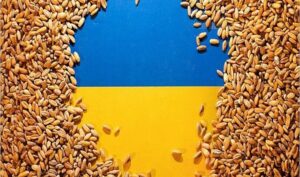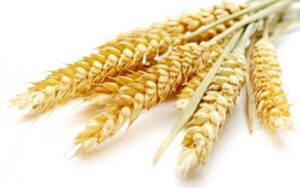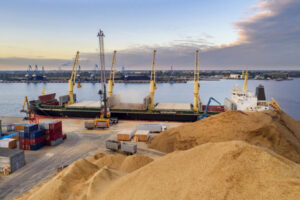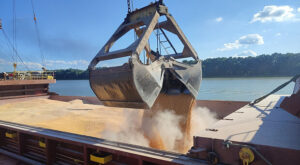
In January 2024, Ukraine exported 7.7 million tons of agricultural products, which is only 0.3% lower than the same indicator of the previous month. At the same time, not all the products managed to cross the border and some of the vehicles are queuing to leave, according to the Ukrainian Agribusiness Club (UCAB).
According to the UCAB, in January 2024, the structure of exports of Ukrainian agricultural products was dominated by grain crops, which were supplied to foreign markets in the amount of 5.3 million tons, which is 1% less than a month earlier. Corn accounted for 63% of supplies, wheat – 30%, barley – 6%.
Ukraine also exported 765 thsd tonnes of oilseeds, which is 1% less than in December. At the same time, supplies of rapeseed accounted for 52% of oilseed exports, soybeans – 40%, and sunflower seeds – 7%.
Vegetable oils were supplied to foreign markets in the amount of 664.5 thsd tonnes, which is 6% less than a month earlier. Sunflower oil accounted for 92% of exports, soybean oil – 5%, and rapeseed oil – 3%.)
In January 2024, Ukraine increased the export of oilcake by 20% to 591.1 thsd tonnes, of which 92% was sunflower cake and 8% was soybean cake.
In January, exports of other types of agro-industrial products decreased by 2% compared to December, with 391.6 thsd tonnes of them being supplied to foreign markets. UCAB analysts attributed the main trends in January exports to the increase in rapeseed exports compared to other oilseeds.
Usually, we managed to export the entire volume intended for this purpose before the New Year. This year, Ukraine still has a lot of exported products,” the experts explained.
The increase in exports of sunflower cake was explained by analysts by establishing exports to China through the existing sea corridor.
The export dynamics makes it possible to gradually reduce the balances of agricultural products intended for export and provide farmers with financial resources for further activities. It is very important to maintain these volumes, or even increase them. After all, not only the food security of Ukraine, but also of many countries of the world depends on the functioning of the Ukrainian agricultural sector,” UCAB summarized.

Ukraine’s seaports are not yet at full capacity and are able to increase the potential of grain transportation, said Yuriy Lytvyn, Head of the Ukrainian Sea Ports Authority (USPA), at a meeting of the Grain Club of the Ukrainian Grain Association on Tuesday.
“The potential of transportation, in particular, from Odesa, is significantly higher. The proof of this is the record results of the Ukrainian “grain corridor”, which was opened after the termination of the “grain initiative” in December 2023,” he said.
According to Lytvyn, the figures for grain exports in January 2024 are slightly lower than the previous month. However, January is the month of the traditional decline in sea transportation.
At the same time, he noted an increase in the delivery of grain cargo to the ports of Greater Odesa by both rail and road.
“Today, the port of Chornomorsk has increased its car handling fivefold compared to the pre-war period. However, unfortunately, bulk cargo is not very good for Chornomorsk itself. There are some difficulties with the organization of the process,” said the USPA head.
He also emphasized that traders and local authorities are doing everything possible to speed up the process and reduce the time for unloading vehicles.
Speaking about the work of Pivdennyi port, Lytvyn noted that it is being used at 30-48% of its capacity to receive grain cargo.
“The Ministry of Infrastructure, together with the Armed Forces of Ukraine and us (USPA – IF-U), are working to expand the acceptance of cargoes that may be damaged (during the shelling of port infrastructure by the Russian side – IF-U). I mean container and ferry transportation,” Lytvyn said.
Answering a question about the fate of the port in Mykolaiv, the head of the USPA explained that the agency pays much attention to its fate and constantly consults with the military.
“The military leadership is unanimous in its position: due to security issues, unblocking the port of Mykolaiv is impossible. The ports of Mykolaiv region are under direct enemy fire from potentially dangerous areas. The military is not giving any forecasts (on the timing of their unblocking – IF-U),” he said.
The head of the USPA also reminded that Ukraine still has the occupied Kherson port, which has not yet had a single employee of the agency on its territory – it is closed.
As reported, the USPA said that Ukrainian seaports are ready to work in any case of destruction and can increase exports of agricultural goods.

In December 2023, KSG Agro agricultural holding exported 4600 tons of wheat to Spain, the company’s press service reports.
According to the report, the wheat was purchased by grain trading companies.
“In wartime, any export delivery is always a task with many unknowns. However, despite numerous difficulties, we continue to export grain to international markets. In the current most difficult period of Ukraine’s history, the food security of many countries depends on us, agricultural producers and exporters,” said Sergiy Kasyanov, Chairman of the Board of Directors of KSG Agro, as quoted in the report.
As reported, in the first quarter of 2023, KSG Agro exported 4,200 tons of grain crops mainly to Asia and Africa. Deliveries were made as part of the “grain corridor” through the ports of Odesa and Odesa region.
KSG Agro, a vertically integrated holding company, is engaged in pig breeding, as well as the production, storage, processing and sale of grains and oilseeds. Its land bank is about 21 thousand hectares in Dnipropetrovska and Kherson regions.
According to the agricultural holding, it is one of the top 5 pork producers in Ukraine.
In January-September 2023, KSG Agro received $1,336 million in net profit, which is almost 14 times more than in the same period in 2022. Its EBITDA for the three quarters of this year increased by 67% to $4.5 million, and sales revenue increased by 16% to $11.9 million.

In 2023, Ukraine’s ports handled 62 million tons, including 56.3 million tons for export, the Ukrainian Sea Ports Authority (USPA) reported on Facebook on Wednesday.
According to the administration, imports amounted to 5.3 million tons. At the same time, the Ukrainian sea corridor has already exported 18 million tons of cargo to 32 countries, 12.7 million tons of which are agricultural products.
“By the end of 2023, about 62 million tons of cargo were transshipped by Ukrainian ports in wartime. Among the leaders in terms of cargo nomenclature are grains – 45.5 million tons and liquid bulk – 6.3 million tons. An undoubted achievement of 2023 was the launch of the temporary sea corridor announced by the Ukrainian Navy, which made it possible to unblock the ports of Greater Odesa. On August 16, 2023, the first vessel used the temporary corridor. According to the results of 2023, 400 vessels exported 12.8 million tons of cargo,” the statement said.
Last year, the Danube ports transshipped 32 million tons of cargo, which exceeds the record figures of 2022, the USPA said in a statement.
The cargo turnover of the port of Izmail more than doubled and reached 20.2 million tons (in 2022 – 8.8 million tons). The cargo turnover of the port of Reni reached 10 million tons (6.8 million tons), and that of the port of Ust-Dunaisk – 1.7 million tons (785 thousand tons).
The cargo turnover of the port of Odesa also increased and reached 8.41 million tons (7.69 million tons in 2022), while the cargo turnover of the port of Pivdennyi decreased to 10.08 million tons (15.28 million tons), and the port of Chornomorsk – 11.41 million tons (11.76 million tons).
“I am very grateful to the business, the team of the Ministry of Development (Communities, Infrastructure Territories) and the employees of USPA for effective cooperation, which has led to a number of technical and technological measures: 23 transshipment points have been launched and 15 investment projects are being implemented, which all helped to achieve such record-breaking results. Despite the fact that a lot has already been done, in 2024 we will continue to work together to further increase cargo turnover and improve the work of the Danube cluster ports,” Yuriy Lytvyn, Head of USPA, was quoted as saying in the statement.
Earlier it was reported that the new Ukrainian sea corridor created by the Ukrainian Navy in August 2023 ensured the export of almost 15 million tons of products, including 10 million tons of agricultural products.

In 2023, Agrotrade exported about 350 thsd tonnes of grain, of which 35%, or 116 thsd tonnes, was the share of its own products, and 65%, or 230 thsd tonnes, was from third-party producers, the company’s press service reported on Facebook.
According to the report, the agricultural holding supplied 214 thousand tons of grain to the world market by “deep water”, 108 thousand tons by the Danube, and 24 thousand tons by land.
“Despite the fact that logistics was a constant problem last year due to instability and high prices, we managed to establish ways to trade from different points – when the Black Sea ports became inaccessible, we started exporting via the Danube. And the opening of the new “grain corridor” greatly simplified our work. We were among the first in the country to use it. So far, it is working perfectly – everything is predictable and there are no queues. (…) In total, we have already shipped four ships, or 66 thousand tons of products, through the Grain Corridor 2.0,” the press service quoted Andriy But, Director of Agrotrade’s Foreign Economic Activity Department, as saying.
According to him, a significant achievement of the past year was the full sale of the agricultural holding’s own 2022 harvest and the increase in trade volumes. In particular, the company managed to export record volumes of winter rapeseed – more than 30 thsd tonnes – via the Danube in a short time. Also, in 2023, Agrotrade’s corn, soybeans and wheat were in demand on the global market.
Speaking about the plans for 2024, Booth said that the agricultural holding expects to fully export its own 2023 harvest and not slow down the pace of trade.
Agrotrade Group is a vertically integrated holding company with a full agro-industrial cycle (production, processing, storage and trade of agricultural products). It cultivates over 70 thousand hectares of land in Chernihiv, Sumy, Poltava and Kharkiv regions. Its main crops are sunflower, corn, winter wheat, soybeans and rapeseed. It has its own network of elevators with a simultaneous storage capacity of 570 thousand tons.
The group also produces hybrid seeds of corn and sunflower, barley, and winter wheat. In 2014, a seed plant with a capacity of 20 thousand tons of seeds per year was built on the basis of Kolos seed farm (Kharkiv region). In 2018, Agrotrade launched its own brand Agroseeds on the market.
Vsevolod Kozhemiako is the founder and CEO of Agrotrade.

In 2023, Ukrainian companies increased imports of copper and copper products by 2.2 times in value compared to 2022, to $140.795 million.
According to customs statistics released by the State Customs Service of Ukraine, exports of copper and copper products decreased by 20.1% to $72.078 million during this period.
In December, the company imported copper worth $20.856 million and exported $6.906 million.
In addition, in 2023, Ukraine reduced imports of nickel and products by 74.2% compared to 2022, to $15.391 million ($1.025 million in December), and increased imports of aluminum and aluminum products by 7.7%, to $366.463 million ($31.951 million).
At the same time, it reduced imports of lead and lead products by 65.2% to $989 thousand ($70 thousand), imports of tin and tin products by 23% to $2.728 million ($310 thousand), but increased imports of zinc and zinc products by 18.8% to $45.966 million ($3.665 million).
Exports of aluminum and aluminum products last year increased by 0.7% compared to 2022 to $97.616 million ($8.433 million in December), lead and lead products increased by 23.5% to $14.778 million ($704 thousand), nickel and nickel products amounted to $532 thousand ($24 thousand), while in 2022 it was $1.268 million.
Zinc was exported abroad in 2023 for $130 thousand ($13 thousand in December) against $1.331 million in 2022. Exports of tin and tin products amounted to $159 thousand (up $79 thousand in December) against $424 thousand in 2022.
As reported, in 2022, Ukrainian enterprises reduced imports of copper and copper products in value terms by 64.3% compared to the previous year to $65.370 million, while their exports decreased by 56.3% to $90.245 million.
In addition, in 2022, Ukraine reduced imports of nickel and nickel products by 49.9% compared to 2021, to $59.754 million, and aluminum and aluminum products by 33.4%, to $340.398 million. At the same time, it reduced imports of lead and lead products by 66.6%, to $2.839 million.
Imports of tin and tin products fell by 33.5% to $3.312 million, and imports of zinc and zinc products decreased by 58.7% to $38.690 million.
In 2022, exports of aluminum and aluminum products decreased by 42.7% compared to 2021, to $96.972 million, lead and lead products – by 68.7%, to $11.970 million, and nickel and nickel products – by 73.9%, to $1.268 million.
Zinc exports in 2022 amounted to $1.331 million, while in 2021 they amounted to $550 thousand. Exports of tin and products in 2022 amounted to $424 thousand, compared to $346 thousand in the previous year.